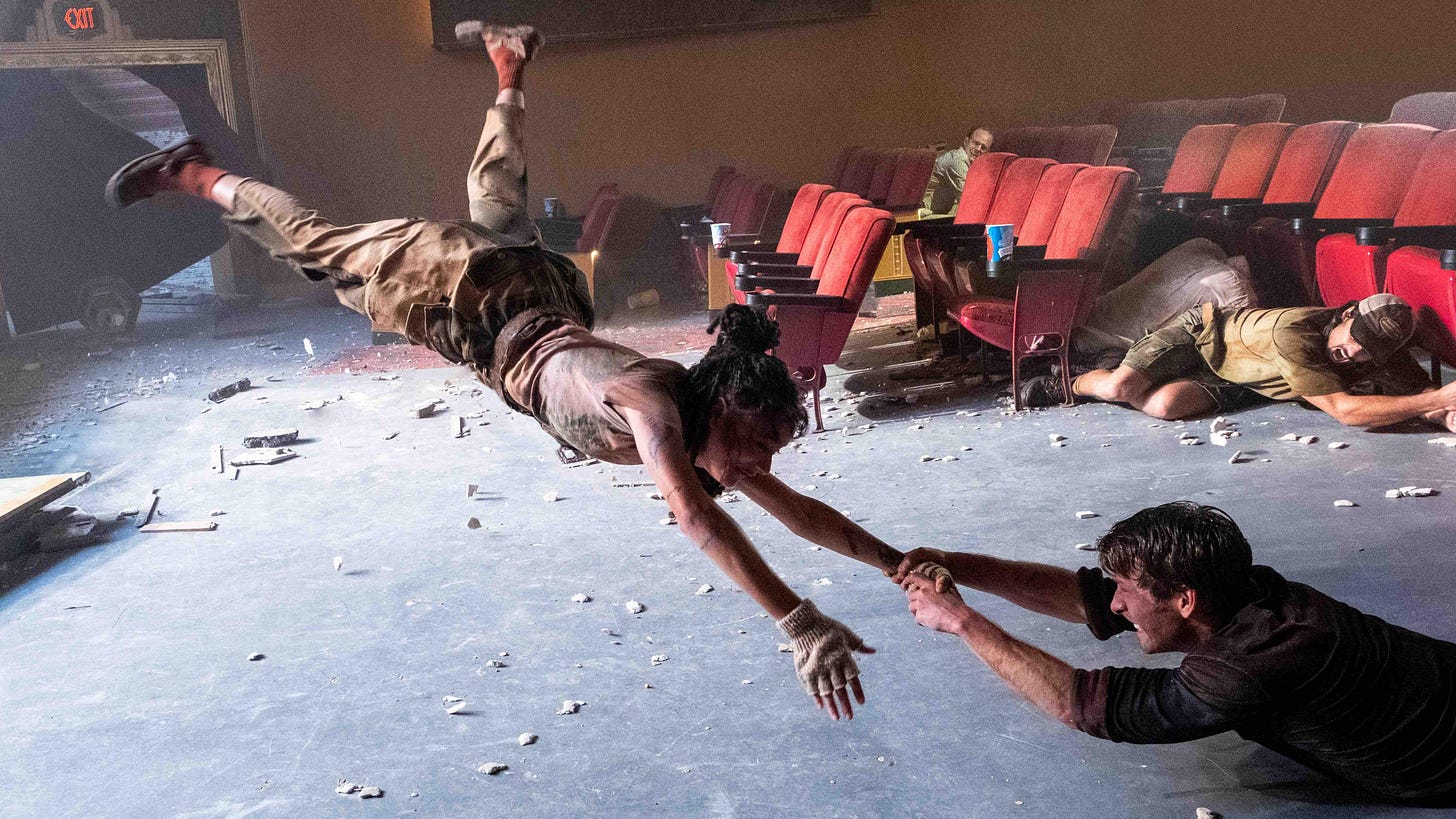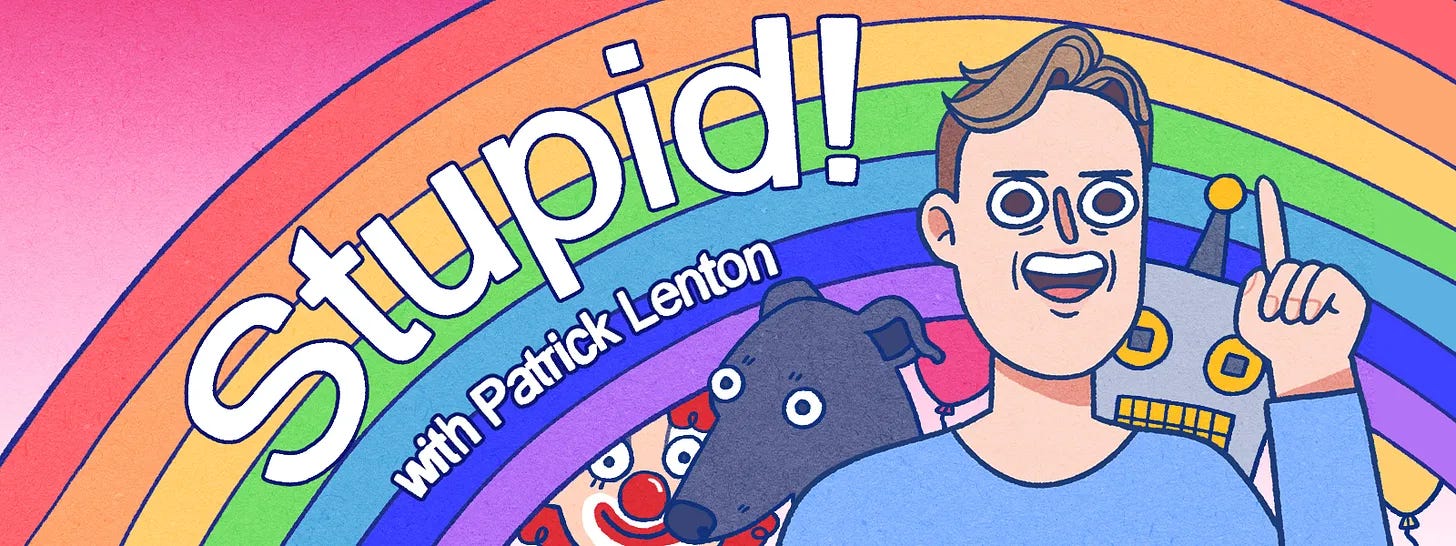Blown away by the lack of sexiness
why is there no smooch in Twisters? What if we kissed... in the path of this tornado?
This article features spoilers for Twisters and also my own dating life.
Recently I had the pleasure of being one half of a true silver-screen coded romantic kiss.
We were huddled close together under the scant protection of a small purple duck umbrella, the pouring rain like a curtain swept around us cutting us off from the world, the only sound our breathing and the water cascading through the trees, the city turned soft and silver in the distance, our faces illuminated only by a distant streetlight. Time became meaningless. The water tricking down the back of my neck a distant annoyance. Even in that consuming moment there was a part of my brain broken enough to think “wow this is just like a movie”.
Which is funny, because not long after this cinematic smooch, I went and saw an actual movie that set us up for exactly this kind of classic film smooch, all the conditions were just right - precipitation levels, cloud structure, a sudden change in wind direction, Glen Powell in a tight wet white t-shirt - but for some reason the tornado of smooching we were all chasing failed to form.
That’s right, I saw Twisters, the movie about two people who just have so much god-damned respect for wind that they basically shake hands over it and never kiss. And movie-goers are CONFUSED. Where’s the kiss? Why aren’t our beautiful action stars rewarded for punching a tornado out of the sky with science by a huge, swelling crescendo, film-ending, lip smooch? Is it censorship or just bad storytelling?
It made me think about the narrative necessity of sex and love on screen.
Twisters is a great film - it hearkens back to the golden era of Hollywood action, an absolute romp that knows exactly what it wants to do and how to have fun doing it. It’s just a fun action film about some people who HATE the wind and want to kill it by any means necessary!
However, crucially, it’s not in any sense nostalgia-poisoned, which most reboots and reborn IP films we’re cursed with these days are, with none of the actors from the original Twister shoehorned into the plot, none of our characters spuriously related to Helen Hunt, almost no sneaky winks to the nineties film. As far as I can tell, the only time they broke this rule was a scene briefly using the old and iconic Twister technology, and a repeat villain (strong winds).
But like many films of the action genre, it relies on a strong romance to help propel the story and create depth to the characters. I would argue that most stories incorporate romance in some form or fashion, because love, romance, sex, yearning, friendship, relationships, horniness, heartbreak and all the other things that fall under the great umbrella of romance - because famously it’s a fundamental part of human existence. But in these action romps, it also plays an important function in storytelling, namely shortcutting our way to caring for the characters. Shortcutting is not laziness or poor storytelling - it’s the difference between plot and story. In improv, there’s a rule to start your scene with a defined relationship between your character and your scene mate - that way we don’t have to spent three minutes watching two zany characters be introduced to each other. We skip to the action.
Every part of the character development in Twisters is quickly served to us through the easily understood lens of romance - we understand the motivations from friend-zoned Javi to pull Kate out of tornado retirement. We get the enemies to lovers trope between Kate and Glen Powell (I know his character has a name but I refuse to use it). We understand the motivating factor that their rivalry gives to the story, and understand that it comes from frustrated mutual attraction. The recognisable dance between the two main characters humanises them, and makes us care enough about them for real stakes - their relationships with each other (quickly) make us care about them being picked up by a twister and thrown into the Oklahoma sky. We don’t have TIME in these films for long character studies - we need the romance as a shorthand to understand these are real people who do not want to be sucked into a vortex.
Romance on screen comes with its own language, and it’s almost universally understood - a semaphore of glances and touches. It’s often the epitome of “actions speak louder than words” - important by definition in an action film. Important in any film where storytelling space is at premium (even though they’re too long these days).
But also important in real life - my recent kiss in that wet and magical park made us cut to the feeling, to borrow a Carly Rae Jepsen term, more meaningfully than weeks of conversation could have. A kiss is a long essay wrote short, a Shakespearian monologue turned Cliffs Notes.
That said - I hate the idea of justifying romance, sex and in this particular case, the banality of an onscreen kiss through utilitarianism. Art, and films, are just ways that we use stories to engage with the totality of the world - and I’d argue that romance, kissing and sex (as well as friendship, rivalries and other relationships) are basic and fundamental parts of it. It might not be for YOU - and that’s fine - but it would be insane to pretend it’s not a pillar of existence, even if you reject it.
By the end of the film, we’ve walked through all the steps of a classic enemies to lover romance between Daisy Edgar Jones and Glen Powell, a woman who did a convincing job of pretending she understands wind, and a man whose face somehow looks like a Soviet era brutalist building that’s been converted into a dance studio. It’s done well - and in the final scene we have him running through the airport to stop her from leaving to New York, a classic and potentially even stereotypical romance trope. He literally bolts his tornado truck into the ground, such is the force of his love. And then… nothing. No kiss. Failure to Launch (2006).
In an interview with Collider, Daisy Edgar-Jones said it was a “note” from executive producer Steven Spielberg that led to the final kiss being cut from the film, rather than the Disney-style trend of capitulating to extremely conservative blocks of audience and de-sexifying every film.
In this article in Vulture, Twisters director Lee Isaac Chung gave another reason, saying:
“The advice I was given that really swayed me was our editor, Terry, telling me, ‘It’s better to leave an audience wanting than to leave them overfilled,’” Chung says. “I think that’s what we’re doing with the kiss. If people actually saw it in the film, they might come away feeling like they didn’t really need it. It’s better to wish that they had kissed rather than to actually see it. Poor Glen jokingly said it was his performance, but it was not.”
I personally think that this is both bullshit, and antithetical to good storytelling - but you know, i’m also a romance writer (Spite Pie coming out May 2025), so maybe I’m biased. A romance narrative relies on a payoff, and in this case the kiss between them would be the cathartic expression of the romantic tension that the film deliberately set up. Stories rely on wish gratification as our reward, and we’re trained to expect stories to play out in logical ways. Even a “twist” should never be an actual surprise, it should be a subversion of the expectations that have been plotted out before us. I cannot stress just how much we are trained to expect a physical romantic conclusion between these characters - and how weird it feels not to get it, like pressing a button to blow up one of those grain silos and watching nothing happen. Also - next time you’re in the mood for a kiss, try asking your crush for a “physical romantic conclusion” - maybe you can justify it as a narrative essentiality.
I don’t know if the lack of kiss comes back to the puritanical strain of thinking that’s come into Hollywood recently - there’s a kind of gold standard essay for all culture writers at the moment called Everyone Is Beautiful and No One Is Horny which talks about the sneaky way that film has been desexed, and it’s worth a read. Even online, I’ve seen lots of puritanical young Americans arguing that sex scenes and passionate kisses don’t “add” anything to the narrative. I hate when old people like myself make sweeping generational generalisations, but anecdotally I have seen this kind of stuff explode in the online discourse. America has always had a huge puritanical attitude, even when they’re being more sex positive - they create a false binary between things like romance and smut, between “making love” and sex, so it’s not a surprise that we’re having one of those cultural turnarounds. But what it’s led to is a kind of weird pushback against sex and physical manifestations of romance on screen - and a desire to “justify” their inclusion. Weird that nobody bats an eye at something like violence in a film, and ask it to be justified as integral to the plot, but a smooch gets pearl clutching?
Asking what the “point” of a sex scene, or a grand climactic kiss, or a romantic moment, or a fingerbanging behind the bike sheds, is just the most depressing thing in the world to me. Even though I’ve spent this essay talking about the way the language of romance is narratively useful, it’s not the point. The point is to try and capture even a fraction of the beauty and mystery and joy and terror of human existence, in all its facets - and a big kiss with the wind cowboy at the end of the film is just part of that. A smooch in a dark park with a beautiful person is not the only reason to be alive, but it’s one of them.
A romance book is defined by having a “happy ever after” - an ending where the two protagonists fall in love and stay in love forever, creating a satisfying punctuation point for the story we’ve been told. Twisters didn’t need a HEA, but it also edged us right to that point where we assumed there would be one, and then denied us the catharsis. It felt like a rollercoaster climbing to the top and then just idling before the huge drop, making everyone get out and walk home instead. It felt like a truck full of special chemicals got sucked up into the sky, swirled around a whole bunch, and then did absolutely nothing at all.
Thank you for reading! This newsletter is funded entirely by the generosity of our paid subscribers, allowing us to commission amazing queer writers and boost marginalised voices. If you like this article and believe in independent journalism, please consider subscribing.











I don’t know if I can see this movie now
I was only in it for the smooches